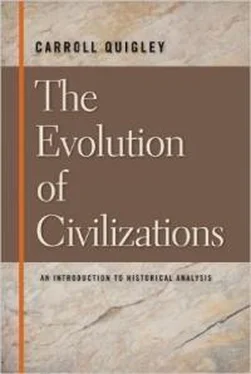If an agricultural unit is operated at peak human efficiency, its output will fluctuate from year to year by a considerable amount, depending on climate conditions. In such a case the overseer of an absentee landlord would have obtained only a modicum of praise in good years (since the high output was attributed to the weather), but would get a maximum of blame in poor years (on the argument that he should have been able to anticipate or compensate for adverse weather conditions). Under such fluctuations the overseer would have a precarious tenure and would frequently have been discharged.
On the other hand, if the farm had a fairly consistent output year after year within narrow limits of fluctuation, the owner would have secured an annual income on which he could depend and the overseer would have a relatively secure tenure. For this reason, there was a general tendency for each agricultural unit to approach a fixed annual output. Such a steady output could be obtained only by stabilizing around the output of the poorer years, since it could not be done around the output of the better years. This means that the overseer drove his slaves hard if a year's output seemed likely to fall below his preset annual output figure, but relaxed discipline whenever it became clear that the year's output was likely to exceed the same preset annual output goal. The amount of output lost in the latter years (the meteorologically better ones) was always more than the amount of output gained by driving hard in the years when output would be naturally lower, since the preset annual figure was closer to the lower-output years than to the higher-output years of the farm under efficient management. The net result of all this was a reduction and stabilization of output on large estates of absentee owners. As the number of such estates increased, the output of the whole economy suffered.
This reduction of output for the system as a whole probably did not occur until after the time of Augustus or even later, and was concealed for a long time by the fact that the Roman political system was expanding geographically over larger and larger areas and thus obtaining control of larger and larger absolute amounts of agricultural produce even when the economic system as a whole was not producing more each year but less.
It is, however, very likely that the Mediterranean economic system as a whole reached its highest rate of expansion before 300 B.C. and was operating at a decreasing rate of expansion by 250 B.C. From 200 B.C. to A.D. 200 its absolute output increased only slightly, and by the latter date economic decline in absolute output had begun. Accordingly, the Age of Conflict for the western Mediterranean began by 250 B.C. and the period of decay for the whole civilization began about A.D. 200.
5. Universal Empire
The Universal Empire of Classical civilization was achieved with the establishment of the political supremacy of Rome throughout the Mediterranean in 146 B.C. The rise of Rome had little to do with the Age of Expansion. Rome began as an Etruscan bridgehead on the south bank of the Tiber at a place where several hills on that bank made it possible to defend a ford that crossed the river by way of an island. Thus from its earliest origin the Roman organization was militarized. Its political expansion, coinciding with the decline of the Etruscans, was dominated by military considerations. By 250 B.C., when the shift from an Age of Expansion to an Age of Conflict gave an increased role to any militarized system, Rome was ready to play that role. Until that moment the usual features of an Age of Expansion were obvious: increased production, increased population, increased geographic area for Classical culture as a whole, and increased knowledge. Of the lesser attributes of this period, democracy is manifest, although science is less so.
After 250 B.C. the attributes of an Age of Conflict became clear: class conflict, imperialist wars, irrationality, and declining democracy. All these acted and reacted on the agrarian slave system, increasing the number of slaves and the size of estates. This monopolization of the land led to a depopulation of the Italian countryside. Many peasants decided that they could live on the dole in Rome easier than they could win a living from the soil. As Seneca wrote about A.D. 50, "Country districts which were once the plowlands of whole villages are now worked by a single band of slaves, and the power of stewards is wider than the realms of kings." He also wrote, "Great troops of slaves whom their owner does not know by sight and the slave prisons echoing to the sound of the lash have no attraction for me." Elsewhere the situation was even worse. Pliny tells us that in the time of Nero (A.D. 54-68), six men held half the province of Africa.
Conditions became worse after 50 B.C. when Italy's industry, which had previously produced metal products and tasteless pottery for export, was unable to compete successfully with the industrial activity of the provinces, especially Gaul. One cause of this may be found in the fact that the craftsmen of Italy were mostly slaves, while those of Gaul were largely free. As a result of this, commerce, which had been flourishing under the republic, began to decrease under the empire, the imperial trade being replaced to a considerable extent by local and provincial commerce, except for the trade in luxury goods and in grain. The latter continued to pour into Italy from the provinces, especially from Egypt, which was also the source of papyrus. Under the republic Italy still paid for these imports by metal goods, red-ware pottery, and other products, but under the empire Italian exports decreased in importance, and imports had to be paid for in gold or silver. This began a steady flow of precious metals from Italy, especially from Rome to the provinces. These metals had to be brought back by new conquests extending the frontiers and by ransacking of the provinces by the provincial governors and armies. Thus the army, the imperialist wars, and the corruption in provincial government were necessary for the economic survival of the Roman system. Plunder kept the system functioning until the military weakening of Rome made it impossible to extend the frontiers further, and neither the supply of si; nor the restoration of specie could be maintained. Thus, by 146 B.C. the Roman state had become the Universal Empire of Classical civilization, although it required another century and a half before class conflicts and imperialist wars were reduced in frequency. The class conflicts led to the so-called civil wars that ended with the triumph of Augustus Caesar in 31 B.C. The imperialist wars continued as Roman attacks on outside peoples, and led to the conquest of Gaul, of Egypt, and of Britain.
By A.D. 96 the Universal Empire of Classical civilization had reached its golden age, a subperiod that continued for about three generations (96-180) under the "Five Good Emperors." Of this period Gibbon wrote, "If a man were called to fix the period in the history of the world during which the condition of the human race was most happy and prosperous, he would, without hesitation, name that which elapsed from the death of Domitian to the accession of Commodus." But, as Gibbon knew well, it needed but a slight change for this golden prosperity to become the brown of overripeness and decay.
6. Decay
By A.D. 200 Classical civilization had reached its period of decay. With the end of continual warfare and the clear inability of Rome's military forces to extend its frontiers further, the supply of both slaves and booty ceased. The unfavorable balance of payments of Italy became more acute. Trade began to decrease sharply, and a tendency for each province, even each large estate, to move toward economic self-sufficiency began. There was a return to grain growing in Italy. Craft activities began to move from the towns to the estates. The towns themselves ceased to grow, and later declined. The decreasing supply of slaves and the exodus of free persons from the town to the countryside gradually brought about an agrarian reorganization in which the landlords began to work their estates with tenants, requiring payment in kind and labor services on their own holdings as part of the rent. These tenants were called coloni.
Читать дальше










